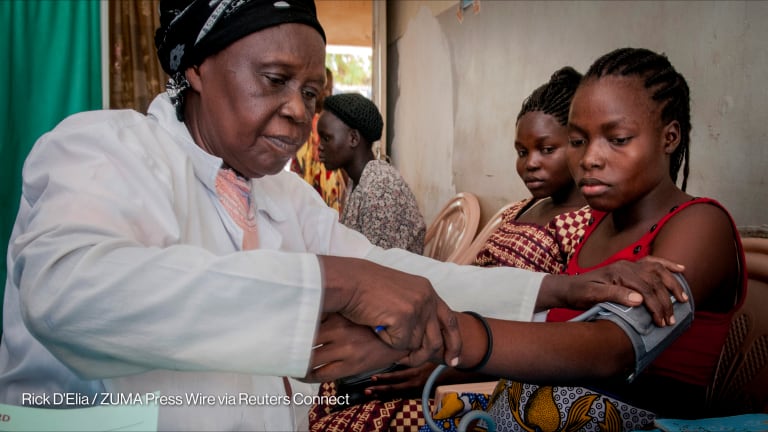Sometimes people miss the obvious. But when it comes to global development, forgetting to address the basics can prove fatal. This is what the World Health Organization, WaterAid, the London School of Hygiene & Tropical Medicine and other aid partners argued when last month they launched a report into how the lack of safe water, sanitation and hygiene in birth settings is killing mothers and newborns in the developing world. Maria Neira, director of WHO's public health and environment department, admits global development actors can sometimes miss the basics. “Sometimes [things are so obvious] that nobody feels responsible for them,” she told Devex. “When you go to a health care facility in Africa, they will recognize that access to safe water and sanitation is fundamental for the health care facility. But they will also tell you: ‘I don’t have the resources for that.’ It has to be another sector investing in it.” Neira quoted forthcoming WHO research that backs the report’s call. It surveyed health care facilities in 54 low-income countries and found 38 percent did not have an improved water source. “When you look at sanitation as well, that brings the proportion to 50 percent,” she added. Neira said WHO will launch a global plan of action by March 2015 on improving access to WASH at all health care facilities. This will aim to drive “coherence among investments,” with Neira suggesting one way to tackle the problem is to ensure health and WASH sectors work more closely together. Her advice to development professionals is to achieve change by challenging aid organizations and the health care sector by using health-related indicators as evidence of whether investments in health and sanitation were working. She added the issue was also one of dignity. “How can you have a health care facility pretending to take care of the health of people without access to safe water and sanitation?” Neira asked. 'Back to basics' Yael Velleman, a senior policy analyst with WaterAid, said the findings of the paper have implications for all development professionals, not just those focused on health care or WASH, and urged implementers to remember the basics when addressing needs within poor communities. “In the paper we showed how it worked in the education sector, because we had a similar effect where you’re seeing a drive towards universal primary education through the [Millennium Development Goals] to get kids into schools, but then the schools are not good enough and the quality is just not there,” she explained. “It’s back to basics to ask where are we putting these schools and do the kids even have somewhere to go to the toilet? Is there water for them to drink? That epiphany has been seen in the education sector perhaps before the maternal newborn health agenda.” Such issues were being addressed by the process of agreeing on the new sustainable development goals, Velleman said, and should be a major theme for the global development sector in the future. “There are two important recognitions,” she noted. “One is that what we did before didn’t work, so focusing on just a couple of things and hoping somehow it’s going to improve everything else didn’t work. We’ve got to look at people rather than diseases, and we’ve got to look at good comprehensive services.” According to Velleman, “it’s no longer good enough to try and target a specific group because the kinds of services and systems you end up with are not good enough to reach everybody.” However, the expert cautioned development professionals to be careful not to break down trust between people and health care facilities when trying to implement improvements. “You’ve got to make sure people are aware of their rights and are demanding better services, but that they’re doing it in a way that improves the system rather than making it worse,” she said. “The last thing we want to do by saying facilities are not good enough at the moment is to turn people away from facilities.” Cross-sectoral collaboration Oliver Cumming, a lecturer on tropical environmental health and water and sanitation at LSHTM, advised development implementers to focus on supporting national governments, and said one way to ensure WASH is included in health care improvements is to encourage separate sectors to work together. “International agencies, donor communities and civil society really need to think about how they’re going to support the national government on bringing these ministries together,” he said, suggesting that actors start by reviewing a country’s existing policies and regulations, followed by an assessment of how well they are implemented. Cumming also acknowledged challenges faced by aid organizations in winning funding for cross-sectoral programs. He said actors must begin by engaging donors such as the U.K. Department for International Development at a policy level, and urged them to make the case for including WASH in funding applications. “We know the results that we achieve will be diminished unless something is done about water and sanitation,” he said. “Every time they put that in a proposal there will be positive feedback, and it will be more likely that donors like DfID think concretely about how they’re going to give financial support and push things in the right direction.” During the launch, Jane Edmondson, head of human development at the U.K. aid agency, called on the development community to help “join the dots” between related issues. She leads a department that covers health, WASH, nutrition and education, and described her job as being to “look at what dots need to be joined up” across those areas. The link between WASH and MNCH WHO, WaterAid, LSHTM and other aid partners published their findings on open access journal PLOS Medicine. The paper notes that despite improvements in health care and progress on MDG 5 to reduce the maternal mortality rate by three-quarters by 2015, the maternal mortality ratio in developing regions is still 14 times higher than in developed regions. Furthermore, the proportion of newborn deaths is increasing. Fewer children under 5 are dying, falling from 12.7 million in 1960 to 6.3 million in 2013. But in the same year, 45 percent of deaths of children under 5 occurred in the first month of life, according to WHO statistics. There is evidence, the paper says, that WASH affects maternal and newborn health. The MDG on sanitation is among the most off track, with WaterAid analysis suggesting sub-Saharan Africa will not reach its goal to halve the proportion of people without access to basic sanitation for 150 years at the present rate of progress. As a result, the report recommends development implementers work with national governments to increase investment in WASH infrastructure, and that donors ensure WASH targets and indicators are embedded in global maternal health frameworks. Without such changes, women and newborns will continue to die simply because of a lack of access to clean water and sanitation. The research suggests one of the reasons for this oversight is that aid implementers are too focused on topline health reforms. It identifies that efforts to improve birth conditions in low-income countries tend to focus on specific measures for maternity care, health systems strengthening and increasing women’s demand for giving birth in care facilities. “Little attention has been paid to the conditions in which births take place,” the report states. “Increasing the use of health care facilities for childbirth without the availability and quality of WASH in these facilities may limit potential health gains.” To illustrate this point, the report cites current WHO recommendations on postnatal care for mothers and newborns that include only one reference to WASH, and points out that WHO’s guidelines for the Standards for Maternal and Neonatal Care include no recommendations on WASH service provision. Check out more insights and analysis provided to hundreds of Executive Members worldwide, and subscribe to the Development Insider to receive the latest news, trends and policies that influence your organization.
Sometimes people miss the obvious. But when it comes to global development, forgetting to address the basics can prove fatal.
This is what the World Health Organization, WaterAid, the London School of Hygiene & Tropical Medicine and other aid partners argued when last month they launched a report into how the lack of safe water, sanitation and hygiene in birth settings is killing mothers and newborns in the developing world.
Maria Neira, director of WHO's public health and environment department, admits global development actors can sometimes miss the basics.
This story is forDevex Promembers
Unlock this story now with a 15-day free trial of Devex Pro.
With a Devex Pro subscription you'll get access to deeper analysis and exclusive insights from our reporters and analysts.
Start my free trialRequest a group subscriptionAlready a user? Sign in
Printing articles to share with others is a breach of our terms and conditions and copyright policy. Please use the sharing options on the left side of the article. Devex Pro members may share up to 10 articles per month using the Pro share tool ( ).
Search for articles
Most Read
- 1
- 2
- 3
- 4
- 5








